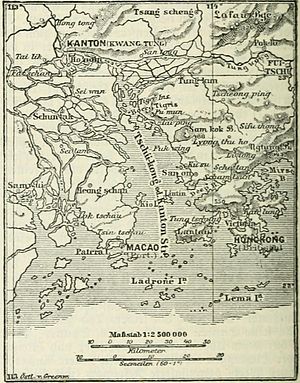
Back Zwischenfall vor Macau German Insiden Makau (1799) ID Incidente di Macao Italian マカオ事件 (1799年) Japanese
| Macau Incident | |||||||
|---|---|---|---|---|---|---|---|
| Part of the French Revolutionary Wars | |||||||
 Map of the mouth of the Pearl River. The Wanshan Archipelago labelled "Ladrone In". | |||||||
| |||||||
| Belligerents | |||||||
|
|
| ||||||
| Commanders and leaders | |||||||
| Captain William Hargood | Rear-Admiral Ignacio Maria de Álava | ||||||
| Strength | |||||||
| Two ships of the line, one frigate | Two ships of the line, four frigates | ||||||
| Casualties and losses | |||||||
| None | None | ||||||
The Macau Incident was an inconclusive encounter between a powerful squadron of French and Spanish warships and a British Royal Navy escort squadron in the Wanshan Archipelago (or Ladrones Archipelago) off Macau on 27 January 1799. The incident took place in the context of the East Indies campaign of the French Revolutionary Wars, the allied squadron attempting to disrupt a valuable British merchant convoy due to sail from Qing Dynasty China. This was the second such attempt in three years; at the Bali Strait Incident of 1797 a French frigate squadron had declined to engage six East Indiamen on their way to China. By early 1799, the French squadron had dispersed, with two remaining ships deployed to the Spanish Philippines. There the frigates had united with the Spanish Manila squadron and sailed to attack the British China convoy gathering at Macau.
The British commander in the East Indies, Rear-Admiral Peter Rainier was concerned about the vulnerability of the China convoy and sent reinforcements to support the lone Royal Navy escort, the ship of the line HMS Intrepid under Captain William Hargood. These reinforcements arrived on 21 January, only six days before the allied squadron arrived off Macau. Despite being outnumbered in ships and guns, Hargood sailed to meet the French and Spanish ships, and a chase ensued through the Wanshan Archipelago before contact was lost. Both sides subsequently claimed that the other had refused battle, although it was the allied squadron which withdrew, Hargood later successfully escorting the China convoy safely westwards.[1]
- ^ Allen, Joseph (1841). Memoir of the Life and Services of Admiral Sir William Hargood. Greenwich, England: H. S. Richardson. pp. 94–95. Archived from the original on 16 November 2022. Retrieved 27 January 2024.